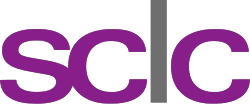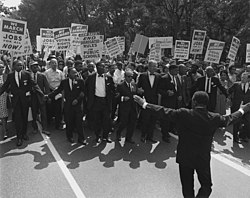Southern Christian Leadership Conference
The Southern Christian Leadership Conference (SCLC) is an African-American civil rights group. The SCLC was very important in the Civil Rights Movement. Martin Luther King, Jr. was its first president.
| Southern Christian Leadership Conference | |
|---|---|
 | |
| Abbreviation | SCLC |
| Formation | January 10, 1957 |
| Purpose/focus | Civil rights |
| Headquarters | Atlanta, Georgia |
| Region served | United States |
| National President/CEO | Charles Steele, Jr. |
| Affiliations | 17 affiliates; 57 chapters |
| Website | www.nationalsclc.org |
Today, the SCLC says it is "a nonprofit, non-sectarian, inter-faith, advocacy organization that is committed to nonviolent action to achieve social, economic, and political justice." This means the group is open to people of all faiths and religions, not just Christians.
Creation
The SCLC was created in 1957, after the Civil Rights Movement's successful Montgomery Bus Boycott. On January 10, 1957, Dr. Martin Luther King, Jr. invited about 60 black pastors and leaders to Atlanta, Georgia. Their goal, at the time, was to end segregation on buses in the Southern United States. However, they agreed that they would only use non-violent ways of protesting and trying to make change. Their motto was: "Not one hair on one head of one white person shall be harmed."[1]
About a month later, the group met again in New Orleans, Louisiana. They decided that their goal would be to end segregation everywhere – not just on buses. They also chose Dr. King as their president, and chose the name "Southern Christian Leadership Conference."[1]
The SCLC also chose a group of leaders called the Board of Directors to be in charge of making final decisions and planning strategies. At first, some churches and civil rights organizations joined the SCLC. However, it was difficult to get churches to join. Groups like the Ku Klux Klan and the White Citizens' Council used violence and terrorism to attack civil rights activists. So did the police in many states. Some churches which joined the SCLC, or did civil rights work, were bombed or set on fire.
Activities
Citizenship Schools
In 1954, civil rights activists started "Citizenship Schools." These schools taught African-American adults to read so they could get driver's licenses; fill out forms; open bank accounts; and pass literacy tests that only black people had to pass to sign up to vote. The program spread across the South. They called themselves the "Highlander Folk School."[2]
In 1961, the state of Tennessee took the Highlander Folk School's land and property away. In that year, the SCLC rescued the Citizenship School program. The Schools' teachers pretended to be teaching adults to read. Secretly, they were teaching about democracy, civil rights, leadership, getting people together to protest, politics, and protest strategies. All of these things would be very important in the Civil Rights Movement.[2]
Eventually, close to 69,000 teachers taught Citizenship Schools throughout the South. Most of these teachers were volunteers who were not paid.[2] Many of the Civil Rights Movement's adult leaders went to or taught Citizenship Schools.[2]

Work in the Civil Rights Movement
The SCLC's work in the Civil Rights Movement included:[1]
- Leading a campaign against segregation in Albany, New York (1961-1962)
- Leading a campaign in Birmingham, Alabama, which succeeded in de-segregating its downtown stores (1963)
- Helping to organize the March on Washington for Jobs and Freedom (1963)
- Helping to organize a protest march where about 25,000 people walked from Selma, Alabama to Montgomery, Alabama to support equal voting rights for African-Americans (1965)
- Running the Poor People's Campaign, whose goal was to decrease poverty among people of all races. About 3,000 people set up a "tent city" on the Washington Mall, and stayed there for six weeks (1968)[3]
- Ralph Abernathy had to take over this campaign after Dr. King was murdered on April 4, 1968
1968-1997
Ralph Abernathy became the President of the SCLC after Dr. King's murder. Under his leadership, the SCLC:
- Continued Dr. King's Poor People's Campaign, which united poor people of all races from all over the country (1968)[4]
- The Campaign got the U.S. government to create programs for poor people, including the Food Stamp Program; free meal programs for poor children; and programs for work, child care, and health insurance for poor people
- Protested the Apollo 11 launch, saying that the government was spending so much money on the Space Race that they could be spending to help poor Americans (1969)
- Helped hospital workers in Charleston, South Carolina get better pay and working conditions
Abernathy was President until 1977. Joseph Lowery replaced him, and was President until 1997.[5]
1997 – today
Since 1997, some of the issues the SCLC has worked on include:[6][7][8]
- Police brutality (police being violent to people, and hurting or killing them)
- Changing the Georgia state flag, which had a big Confederate cross on it
- After the SCLC's campaign, Georgia did change its state flag
- Racial profiling (assuming something about a person because of their race; for example, assuming a black person is a criminal because they are black)
- Prisoners' rights
- Educating young people and adults about personal responsibility, leadership, and doing things to help their community
- Continuing to fight discrimination
- Supporting affirmative action
- Continuing Dr. King's Poor People' campaign
Southern Christian Leadership Conference Media
Martin Luther King Jr. at the March on Washington
Related pages
References
- ↑ 1.0 1.1 1.2 Trueman, C.N. (March 27, 2015). "Southern Christian Leadership Conference". The History Learning Site. Retrieved March 8, 2016.
- ↑ 2.0 2.1 2.2 2.3 Payne, Charles (1995). I've Got the Light of Freedom: The Organizing Tradition and the Mississippi Freedom Struggle. University of California Press.
- ↑ McKnight, Gerald D. (1998). The Last Crusade: Martin Luther King Jr., the FBI, and the Poor People’s Campaign. Basic Books. pp. 107-112. ISBN 978-0813333847.
- ↑ Mantler, Gordon K. (2013). Power to the Poor. University of North Carolina Press. p. 5. ISBN 978-0807838518
- ↑ Hoiberg, Dale H., ed. (2010). "Abernathy, Ralph David". Encyclopedia Britannica (15th ed.). Chicago, IL: Encyclopedia Britannica Inc. p. 29. ISBN 978-1-59339-837-8.
- ↑ Gettleman, Jeffrey. August 5, 2001. "M.L. King III: Father's path hard to follow." Los Angeles Times
- ↑ Firestone, David. July 26, 2001. "A civil rights group suspends, then reinstates, its president." The New York Times.
- ↑ "About Us". SCLC National. Southern Christian Leadership Conference. 2014. Archived from the original on March 15, 2016. Retrieved March 8, 2016.







